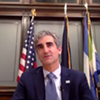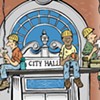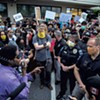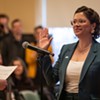click to enlarge 
- Courtney Lamdin ©️ Seven Days
- Miro Weinberger
Mayor Miro Weinberger’s preliminary budget proposal for fiscal year 2022 relies heavily on
federal coronavirus relief funds to close the revenue gap created by the ongoing pandemic.
The spending plan also calls for investing in racial equity by hiring additional staffers for the city’s Office of Racial Equity, Inclusion and Belonging, a promise that Weinberger made in his State of the City address last month.
The mayor said he hopes the influx of federal cash will help tamp down tax increases after what has been an economically challenging year.
“This creates a complex and an exciting challenge,” Weinberger said at a virtual press conference on Wednesday. “With this budget, we must restore full city operations, make structural progress on strategic priorities and really carefully steward this unprecedented infusion of one-time resources.”
The city would use $11.1 million of its $27.3 million federal allotment to close budget shortfalls caused by restaurant closures, program cancellations and other revenue sources that were upended by the pandemic. Other chunks would be used to replenish the city’s rainy day and enterprise funds, the proposal shows.
The remainder — between $10-15 million — would be set aside for initiatives that will be identified after “a series of public conversations” later this year, Weinberger said. Municipalities have until 2024 to spend the coronavirus funds.
The mayor’s proposal would more than double staffing in the Racial Equity, Inclusion and Belonging Office. The positions include an equal opportunity specialist, racial equity data analyst and an anti-racism curriculum manager, who would be assisted by eight temporary “curriculum facilitators.”
The facilitators "will be leading this anti-racism training for all city staff over the first year," Weinberger said, while the curriculum manager would be a permanent position,
The city’s two health equity staffers would be transferred to the office, bringing that city department from three full-time staff to eight.
The investments would help city government be “much more of an anti-racist organization than we are today,” Weinberger said.
Other new hires would include an economic recovery administrator, two urban park rangers and a “redaction specialist” at the Burlington Police Department to “respond to public requests and get out body camera footage in a quicker way,” Katherine Schad, the city’s chief administrative officer, told the city council’s Board of Finance on Monday night.
The police budget, which was
reduced significantly after calls for police accountability last June, will be further discussed on May 19, one of a series of budget meetings scheduled before the full council votes on the proposal in June.
Weinberger has also proposed paying every city worker a livable wage, including the seasonal and temporary workers that are currently excluded from the city’s ordinance. The plan would cost about $290,000 annually, according to the mayor. Another $150,000 would be added to compensate people who serve on city boards and commissions.
City councilors who serve on the Board of Finance will get their first crack at the proposal on May 24, with the full council weighing in on June 7; a final vote is scheduled for June 14. On Monday, Board of Finance members urged Weinberger to solicit public input earlier in the budget process, particularly after fraught budget talks last June pushed the final vote until the eleventh hour.
During Wednesday's press conference, Weinberger invited the public to participate in the meetings' public forums, starting with the council meeting on Monday, and to take a survey about spending initiatives.
The nine-question form asks respondents to rate various proposals on a scale of "Very Supportive" to "Not Supportive" and offer comments.
"One of the goals we have for this budget process is for it to be a collaborative one that produces a budget representing a broad consensus," Weinberger said, adding, “We are wanting as much public input as possible.”






























































